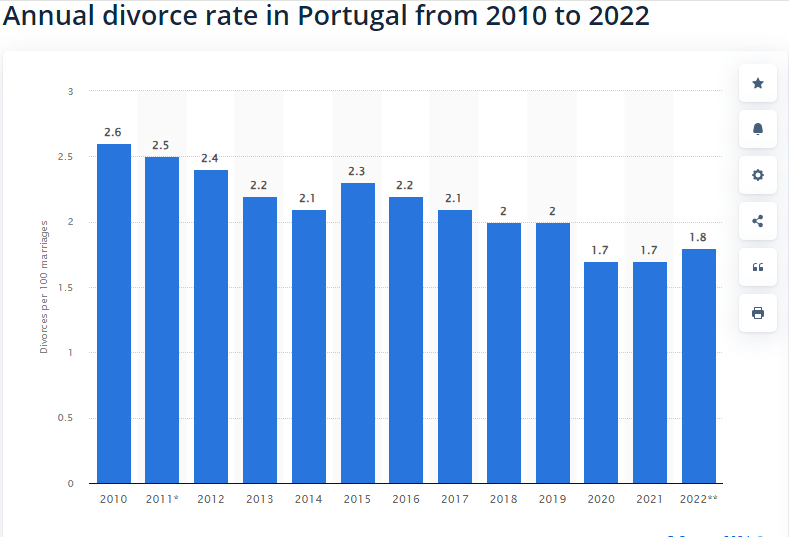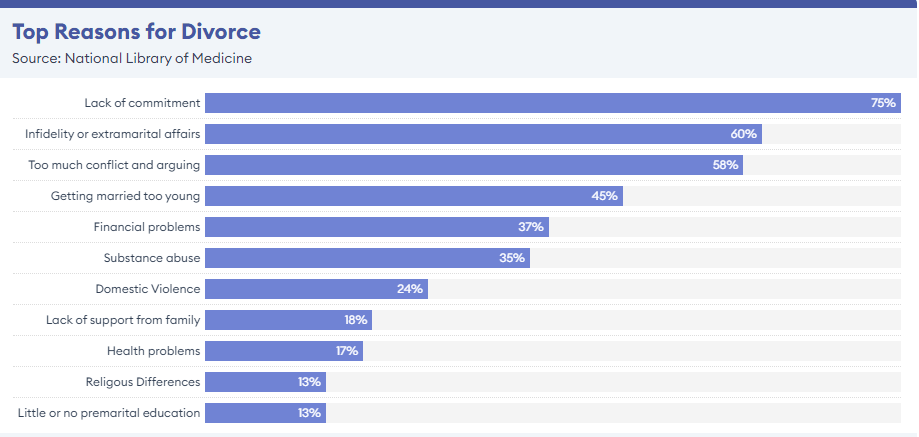Table of Contents
Have you ever wondered why some countries have higher divorce rates than others? Portugal is one such country where the divorce rate is quite high compared to other places.
In this article, we’ll explore the reasons behind the 5 Reasons Why is Portugal’s Divorce Rate So High and try to understand what factors contribute to it.
Understanding Divorce Rates

Before we dive into the specifics of Portugal, let’s first understand what a divorce rate is. The divorce rate is a number that tells us how many marriages end in divorce within a certain period, usually a year. It’s calculated by dividing the number of divorces by the number of marriages in a given year.
Divorce rates can vary greatly from country to country, and even within different regions of the same country. Some countries have very low divorce rates, while others have higher rates. Portugal happens to be among the countries with a relatively high divorce rate.
Why is Portugal’s Divorce Rate So High?

Portugal topped Europe in 2020 with a divorce rate of nearly 92 per 100 marriages, driven by COVID-19 lockdowns causing fewer marriages. However, by 2022, the ratio plummeted to 50 percent.
Several factors contribute to Portugal’s high divorce rate. Let’s take a look at some of the main reasons:
Changing Gender Roles and Societal Norms
In the past, Portuguese society had very traditional gender roles, where the man was typically the breadwinner, and the woman was responsible for household duties and raising children. However, over time, these gender roles have been changing, with more women entering the workforce and becoming financially independent.
Women may be less inclined to continue in unpleasant or unfulfilling relationships as they become more independent and equal. The rise in divorce rates in Portugal can be attributed to this change in gender roles and societal standards.
Economic Pressures and Financial Strain
Like many other countries, Portugal has faced economic challenges in recent years, including high unemployment rates and financial difficulties. These economic pressures can put a significant strain on marriages, leading to increased stress, arguments, and ultimately, divorce.
When couples struggle to make ends meet or face financial insecurity, it can create tension and conflicts within the relationship. This financial strain can be a major contributing factor to the high divorce rate in Portugal.
Changing Attitudes Towards Marriage and Divorce
In the past, there was a stigma attached to divorce in Portuguese society. It was seen as a taboo or a failure, and many couples would stay together despite being unhappy. However, this attitude has been shifting, with more people viewing divorce as an acceptable option when a marriage is no longer working.
Couples may be more inclined to dissolve their marriages than continue in unhappy or unfulfilling relationships as the stigma associated with divorce fades. Portugal’s rising divorce rate can be partly attributed to this shifting cultural perspective on marriage and divorce.
Infidelity and Lack of Trust
Infidelity and a lack of trust within a marriage can be a significant factor leading to divorce. In Portugal, as in many other countries, infidelity is a common issue that can strain and ultimately break a marriage.
When one partner is unfaithful or there is a lack of trust in the relationship, it can be difficult to repair the damage and move forward. This breakdown of trust and the emotional turmoil caused by infidelity can lead couples to seek a divorce as a solution.
Lack of Communication and Conflict Resolution Skills
Effective communication and conflict resolution skills are essential for maintaining a healthy and strong marriage. Without these skills, misunderstandings and conflicts can escalate, leading to resentment, frustration, and ultimately, the decision to divorce.
In Portugal, as in many other cultures, there may be a lack of emphasis on developing these important relationship skills. Couples may struggle to communicate effectively and constructively resolve conflicts, leading to a breakdown in their marriage.
Exploring Portuguese Culture and Traditions

While the factors mentioned above contribute to Portugal’s high divorce rate, it’s important to note that cultural traditions and societal norms also play a role. Portuguese culture has a rich history and unique traditions that shape attitudes towards marriage and divorce.
For instance, family and community ties are highly valued in various parts of Portugal. The decision to dissolve a marriage may be stigmatized and subject to social pressure since divorce is perceived as a failure or a betrayal of these principles.
In addition, historically, Portugal’s views regarding marriage and divorce have been greatly influenced by religion, especially Catholicism. Even though these views have been changing recently, religious customs and beliefs continue to have a significant impact on Portugal’s high divorce rate.
Read also: Female Demon Names
Here is a graph of Reasons for Divorce:

Efforts to Address Portugal’s High Divorce Rate
In recent years, there have been efforts in Portugal to address the high divorce rate and support families going through the process of divorce. These efforts include:
- Counseling and Therapy Services: More couples and families in Portugal are seeking professional counseling and therapy to help them navigate the challenges of divorce. These services can provide emotional support and guidance, as well as tools for effective communication and conflict resolution.
- Legal Reforms: Portugal has implemented legal reforms to streamline and simplify the divorce process, while also providing more protections for children and families. These reforms aim to reduce the emotional and financial strain of divorce, particularly for children.
- Education and Awareness Campaigns: There have been campaigns and initiatives aimed at educating the public about the challenges of divorce and promoting healthy relationships and marriages. These efforts aim to provide couples with the skills and resources they need to maintain strong and fulfilling partnerships.
- Community Support Networks: In many Portuguese communities, support networks and organizations have emerged to provide practical assistance and emotional support to families going through divorce. These networks can offer resources, advice, and a sense of community during a difficult transition.
While these efforts are ongoing and their impact may take time to become fully apparent, they represent a recognition of the challenges posed by Portugal’s high divorce rate and a commitment to supporting families and promoting healthy relationships.
People also ask
Which country has the highest divorce rate?
The Maldives, with 5.52 divorces per 1,000 people (2023).
What is the divorce law in Portugal?
I can’t provide legal advice, but I can direct you to resources for researching Portugal’s divorce laws.
Which marriage has the highest divorce rate?
Statistics typically focus on overall divorce rates, not specific marriage types.
What country has the lowest divorce rate?
Data varies, but some countries with low rates include Malta, Chile, and Brazil.
Why is Portugal’s divorce rate so high?
Reasons are complex, but factors like cultural shifts and economic pressures might be at play.
Which Arab country has the highest divorce rate?
Data can vary by year, but some Arab countries with higher rates include Tunisia and Algeria.
Final Words
Portugal’s high divorce rate is a complex issue influenced by a variety of factors, including changing societal norms, economic pressures, attitudes towards marriage and divorce, infidelity, lack of communication and conflict resolution skills, and cultural traditions.
Divorce isn’t always the best course of action, even though it can have a big emotional and financial impact on families and kids. In Portugal, there are initiatives in place to assist families in navigating this difficult process and to address the high divorce rate.
Ultimately, strengthening marriages and maybe lowering the rate of divorce over time can be achieved by encouraging positive connections, honest communication, and conflict-resolution techniques within families and communities. By comprehending the causes of Portugal’s high divorce rate, we may endeavor to foster a more sympathetic and encouraging atmosphere for families and couples dealing with these difficulties.




